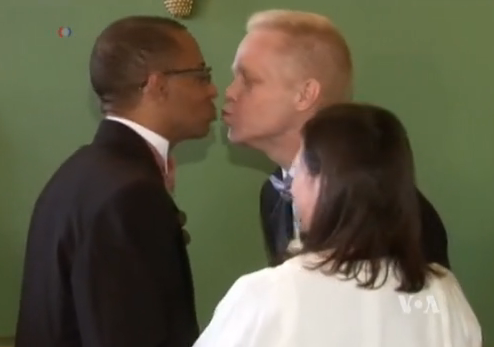VOA常速英语: 印第安纳州在宗教自由方面存在争议
America has experienced a sea change in attitudes in the last decade, to the point where more than two-thirds of U.S. states now allow homosexuals to get married.
And so the focus of the fight has shifted, from whether gays and lesbians have the right to marry to whether businesses — such as wedding photographers and caterers — that are owned by dissenters should be required to serve same-sex couples.
“It stems in part from opponents of same-sex marriage realizing the trajectory that marriage equality is on right now,” said Sarah Posner of the online magazine Religion Dispatches, “and they’re looking for ways to, in their words, maintain their own religious beliefs, practices, in the face of a changing culture.”
Indiana’s state government triggered a nationwide controversy by approving a law that critics say is aimed at allowing discrimination against gays and lesbians.
Indiana Senate Bill 101 was signed into law March 26 by Governor Mike Pence, in the presence of leaders from different faiths.
The bill was promoted mainly by conservative Christian groups and was based on a 1993 federal statute, the Religious Freedom Restoration Act, which was initially meant to protect religious minorities. It grew out of the desire to safeguard a Native American ritual involving an outlawed psychedelic substance, the peyote plant.
'There's been misunderstanding'
RFRA initially was meant to shield religious practices from government intrusion, but critics say Indiana lawmakers expanded it in a way that will allow businesses to turn away same-sex couples.
 |
|
Indiana Controversy Highlights Divergent Meanings of Religious Freedom |
Pence called a news conference Tuesday to deny the allegation. “Clearly, there’s been misunderstanding, and confusion, and mischaracterization of this law,” he said.
But he added that if the law does “create the impression that businesses have the right to turn away customers for sexual orientation or any other reason,we're going to fix that."
The religious-freedom argument also has been employed by conservatives to roll back a part of President Barack Obama’s health care reform. Last year, the Supreme Court ruled that private companies don’t have to provide coverage for contraceptives as required under Obamacare, in a case brought by the Hobby Lobby chain of craft stores, which is owned by an evangelical Christian family, as well as a Mennonite woodworking factory.
That case was argued by the Washington-basedBecket Fund for Religious Liberty, a law firm that also has represented clients under RFRA laws, which have been adopted in 20 states.
The firm’s executive director, Kristina Arriaga, said that so far, all of the cases that have been brought by wedding photographers and bakers not wanting to serve same-sex couples have lost in court.
“So this idea that for some reason the Indiana law is a magic wand where religious people would automatically be in the right, and would win the case, is just not true,” she said.
Different interpretations
But the Indiana controversy underscores that in America, religious liberty can mean different things to different people.
Conservatives like Arriaga say it’s about practicing your faith anytime and anywhere.
“You should be able to live according to your deeply held convictions whether you’re at work or at home, not only on Fridays, Saturdays and Sundays, but also on Wednesdays,” she said.
The other view is that sometimes people have to be protected from religion.
“Liberals are in favor of protecting religious freedom robustly, when people’s religious freedom is infringed upon by government action,” said Posner, the journalist. “They are not in favor of expanding that type of protection when it has a negative impact on third parties.”
On April 28, the Supreme Court will begin hearing arguments on whether state governments can ban same-sex marriage. Thirteen states have passed such bans.
If the court strikes them down, the line between one American’s religious freedom and another’s civil rights may get even harder to define.
- 频道推荐
- |
- 全站推荐
- 推荐下载
- 网站推荐




















